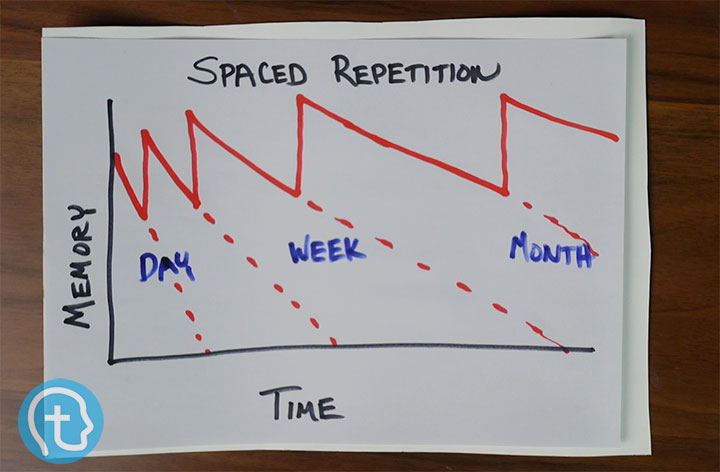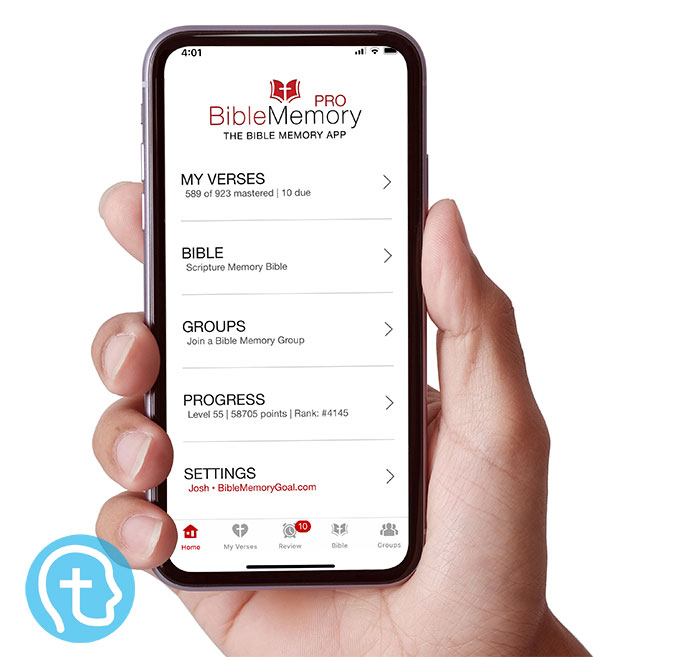If you’re going to spend the time memorizing the Bible, don’t you want to remember it for as long as you can? Personally, I want to memorize for life, which means that the way that I review is critical to be sure that I actually retain the verses, chapters and books that I am memorizing.
Follow along with all the Bible Memory Goal YouTube videos!
I don’t care what kind of method you use to memorize Bible verses, chapters or even books of the Bible, unless you review, you will forget.
It’s great to be able to say a chapter or book you memorized when someone asks you about it next week or next month.
But what about next year?
Or when you’re 80 years old?
In order to learn how to review well, we have to understand one important thing about how our memory works. And once we get that, I’ll share with you 5 practical ways that you can apply that learning to how you review the verses and chapters you have memorized.
Understanding Spaced Repetition for Memory

Back in the late 1800s, a German psychologist named Hermann Ebbinghaus found that our brain works on what’s known as a forgetting curve.
This curve charted how quickly we forget what we memorize as an exponential curve.
Each time we “re-memorize”, study Bible verses, or review the information – something he referred to as savings – that curve would flatten out and would become stronger in the brain. It’s decline over time was less pronounced.
It looked something like this.

This theory has turned into something known as spaced repetition in the memory world and there has been a lot of research and studies to back this up.
It’s been proven that the steepest lost in our memory occurs within the first 24 hours. For me, I’ve noticed this even within an hour or two of committing a few verses to memory. So if I can review a new Bible verse within the first 12 hours, I’ve now created a slightly stronger memory that will last longer than 24 hours.
Then, I review it again after two days. After that four days, then a week, then twice a month, and so on.
The only caveat here is that if I find that I have forgotten the memory at any of these intervals, I reset the repetition cycle.
Why is This Important?
One of those good verses to memorize is Joshua 1:8, when Joshua is commanded to “Keep this Book of the Law always on your lips; meditate on it day and night, so that you may be careful to do everything written in it.”
How can you constantly meditate on something that you’ve forgotten?
My goal is to take Bible passages to memorize and keep them for life. I want to have God’s Word hidden in my heart until the day I die, so the way that I review has an unbelievable impact on whether or not I accomplish that goal.
Memory recall requires reciting in spaced repetition.
You can do this manually or nowadays there’s even software that can automatically create this spaced repetition for you as you memorize Bible verses.
5 Great Methods for Bible Memory Review
Now that you hopefully understand the importance of spacing out your Bible memory review over the course of days, weeks, months, and eventually years, I want to share with you some practical and creative ideas you can use to review your Scriptures to memorize using a variety of our basic senses.
These are methods I’ve either used personally or have learned while interviewing other Bible memory experts who share a love for Jesus Christ and the Word.
1. Record Yourself and Listen to It
I love to record myself reading the section of the Bible that I’m trying to memorize as a voice memo on my phone. Nothing fancy, just the app that comes with my phone. Susan Heck, who has memorized the entire New Testament, explained how she did it here.
I do the same thing while I’m taking a walk with my dog, in the car, or just have some extra time.
And I think it’s important that I’m not listening to an audio version of the Bible, but that it’s actually me reading what I’ve memorized using my own inflections and pronunciations. This method of review exercises our sense of hearing and is great for those who are auditory learners.
2. Write It Down on Paper
The second method is one that I learned from Tom Meyer, aka The Bible Memory Man. He likes to sit down every day for about an hour and write different sections of Scripture that he has memorized.
This method of review engages your sense of touch and sight as you write out the words and see them on the page. If you’re a person who considers yourself a “visual learner”, this might be a method worth considering.
It takes a bit of time, but wouldn’t it be cool to have a collection of Bible books that you’ve written in your own hand from memory?
3. Use Flashcard Apps (such as Anki)

The third is a method that I’ve borrowed from my language learning days. Back when I was studying Spanish and Chinese, I loved using this flashcard app called Anki.
It’s a simple app, but the power lies in the fact that once you create the cards for your memory – however you want to create them – the software does all the hard work of figuring out spaced repetition for you.
So as long as you spend a little bit of time every day reviewing your flashcards, the app itself will determine when your memory needs to be refreshed on certain verses until at some point, it’s months until it shows you a flash card for a verse you basically know by heart now.
4. Review with the Bible Memory App
Last year I started using the Bible Memory App and it’s done a great job of doing what Anki does (there are a number of other mobile apps for Bible memory). These apps help to “gamify” my Scripture memory by not only allowing for spaced repetition, but also giving me points, levels and badges as I progress.

I don’t ultimately care about my ranking or how many badges I have, but that little dopamine hit I get when I level up or earn a badge is just a little bit of fun encouragement and believe it or not, it helps.
The Bible Memory App is free to use – although they have a premium version – and it’s one of a handful of Bible memory resources I recommend.
5. Review with Accountability (Orally)
The final technique for reviewing your Bible memory that I want to offer here is accountability. Do you have a friend, family member or spouse that could you meet with once every couple weeks or maybe just once a month and recite some of the verses you have memorized?
There’s two things at work here when you use this accountability review method.
- First, there’s the accountability of knowing that you have to memorize by a certain point in time so that you can say it to this person;
- The other part is actually saying it out loud;
The act of turning your memory into a vocal expression is a powerful thing. It engages our mind, our mouth and our ears and the challenge of it is one of the reasons that I have an entire playlist on the Bible Memory Goal YouTube channel dedicated to reciting from beginning to end the books of the Bible that I’ve memorized.
It’s hard to do it out loud, in a single sitting, and that accountability has really made a difference in my own Scripture memory.
BONUS! Virtual Accountability
For many people who are memorizing Bible verses but don’t have family or friends that they can share it with, there are virtual options available. For example, you can:
- Join our Bible Memory Community (free!): There are now thousands of people from around the world who gather virtually to encourage and inspire each other to memorize the only Word that brings eternal life.
- Get a Bible Memory Coach (premium): It’s possible to get your own Bible memory coach who can help you set the right goals and keep you accountable to them.
Final Thought: Don’t Waste the Time
Please remember this: no matter what age you are, whether you’re 60 or 16 years old, you can memorize for life. This is the example that our Lord Jesus Christ gave when He was on earth, so it’s worth following!
And if you’re going to put in the time to commit the Bible to memory, it’s worth reviewing well so that it can remain up here until you pass away.




Leave a Reply